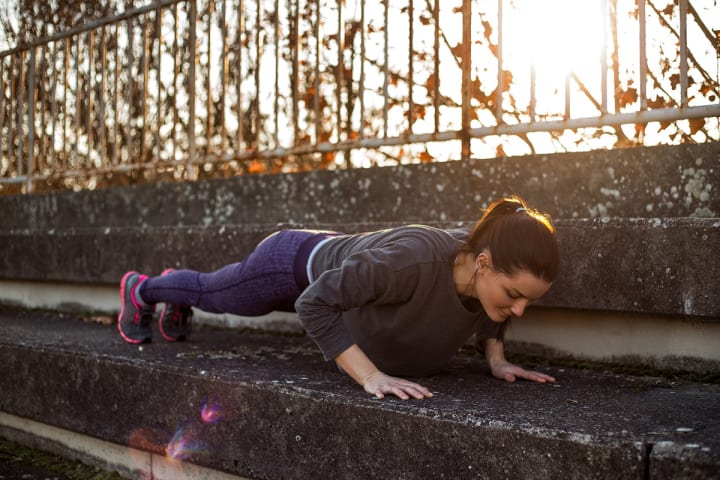Exercise and Illness
Exercise can prevent lesser illnesses like sore throats as efficiently as it prevents heart disease and diabetes.

Statistics show that people who work out regularly are less likely to develop cancer, heart disease, and diabetes. This is common knowledge, but what about the lesser illnesses like sore throats, runny noses, and coughs—or the more serious ones like flu and pneumonia?
There are definite connections. The body's ability to fend off infection can be affected by how often you exercise. And keeping workouts sane and moderate may indeed help keep you healthy. Conversely, there's plenty of evidence to suggest that running yourself ragged at the gym could leave you more open to colds and the flu.
Studies of athletes have provided the most telling evidence of the latter. Marathon runners, for example, typically come down with colds right after a race. To find out why, researchers tested marathoners before and after a three-hour run. They found that the levels of disease-fighting cells (among them natural killer cells, the first to attack a health-threatening bacterium or virus) were depleted for up to 21 hours after the grueling workout. That would leave the runners extra-susceptible to infection for nearly an entire day post marathon.
Scientists found a similar trend in swimmers. During a four-month training season, in which workouts grew increasingly intense, the athletes' saliva showed lower and lower levels of the antibody immunoglobulin-A (IgA), the body's main protection against upper-respiratory infections. Not only were the antibody levels low immediately after exercise, but they remained suppressed between workouts as well. The swimmers' IgA levels increased only during the final month, when the athletes began to ease back on their training.
So far researchers aren't certain why strenuous exercise might compromise the immune system. Some theorize that expending so many calories may deplete the body of nutrients necessary for manufacturing antibodies. One scientist offers another explantion. "We know that intense training creates minuscule tears in the muscles. It may be that a good share of the body's immune defenses are called on to repair them, leaving fewer defenses available to fight infections."
Workouts that Keep You Well

Not everyone trains like a marathoner, of course. "Still, it's likely that someone who takes up exercise after a long hiatus and does too much too soon will experience similar decreases in immunity." says the scientist. Chalk up one more reason to enter into an exercise program slowly, no matter how enthusiastic you are about the prospect of getting fit.
In fact, if you pace yourself moderately, you may actually boost your body's ability to fight infection. In one study, 37 men followed an exercise regimen similar to what most people would do on their own: They cycled on stationary bikes at a moderate intensity for 20 to 40 minutes, three times a week. Researchers measured saliva IgA levels before the study started, after six weeks and after 12 weeks. They also checked the fitness levels of each exerciser. Those who got fitter also showed an increase in IgA, suggesting that for exercise to heighten immunity, it has to heighten fitness as well. Which means that you have to work out long, moderately hard and often enough to improve aerobic strength and stamina.
Even more compelling are studies involving exercisers who've been exposed to the human immunodeficiency virus (HIV), the AIDS-related virus. A recent study of 37 men who tested positive for HIV (some diagnosed as having AIDS) revealed that thrice-weekly, one-hour workouts (including aerobic exercises, strength training and stretching) didn't weaken their immune systems any further. In fact, the exercisers experienced a slight increase in certain immune cells in their blood.
Can sensible exercising completely protect you from illness? Probably not, but if you do get sick, symptoms may be shorter-lived and less severe. Take it from 40 mildly obese, sedentary women. During the height of the winter cold season, some of them walked for 45 minutes five days a week, while others read or watched TV. All the walkers improved their physical fitness significantly, while the inactive women's cold symptoms lasted an average of almost three times longer than the walkers'. According to researchers who conducted the study, light exercise seems to build up the immune system—perhaps not enough to prevent colds completely, but at least enough to keep them mild.
Exactly how much exercise is just the right amount for building immunity is still under study? For now, experts advise sticking with three or four aerobic workouts a week, around 30 minutes each, at an intensity hard enough to produce a sweat. Whether this formula will keep you and your immune defenses healthy for life is also under question. The work done so far, however, indicates that it certainly can't hurt and can probably help.
Longevity Sports

As a life lengthener, swimming ranks right up there with running, cycling, cross-country skiing, and other aerobic activities: It tunes the heart and decreases the risk of diseases that can threaten longevity. But if you're looking for a sport to work off pounds, swimming is a washout.
A study involving 31 men and women, aged twenty-one to fifty, who were overweight by 15 to 40 pounds, solidified this statement. The people were divided into six groups, and each group was assigned one of five diet-and-exercise combinations. The significant difference was between non-dieting runners and non-dieting swimmers. After 10 weeks, both groups shed some weight and body fat, but the swimmers retained up to 5 percent more body fat than did the runners, even though both had the same amount of activity at the same intensity. (Interestingly, an earlier unrelated study at the University of California, Irvine, compared the weight-loss records of women who swam, walked or cycled; the swimmers actually gained weight in that case.)
When studying the diet diaries of the subjects (they were instructed to keep track of all they ate during the study), researchers hit upon what might explain the swimmers' lower weight loss. Even though the exercisers were instructed to eat normally, both groups took in fewer calories than usual—not surprising since there's some evidence that exercise tends to dampen the appetite. The runners ate significantly less, however, averaging 366 fewer calories per week, whereas the swimmers skimmed off an average of 81 calories. “It looks like swimming didn't suppress the exercisers' appetites as much as running did," says Smith.
But if swimming's your thing, don't feel you have to trade your nose plugs for running shoes—especially if you're injury-prone: Because it's non-weight-bearing, swimming puts far less stress on bones and joints. Plus, you work both your upper and lower body no matter what strokes you use. Just count calories as carefully as you count laps.
Exercise for Elation

Few would dispute that exercise can better moods as well as bodies. But researchers now know when—though they're still not sure why. After analyzing more than 100 studies on the mood/exercise link, a team concluded that the "high" kicks in after just 21 minutes of aerobic activity and can last 30 minutes to five hours post exercise. Not only that, but the data showed that regular workouts can actually calm anxiety-prone people.
The reasons, however, are far less clear, though theories abound. Some say exercise triggers the release of the natural mood-lifting hormones called endorphins. Others think it fine-tunes the sympathetic nervous system, which regulates reactions to stress. Another hypothesis (put simply) suggests that just the relief of stopping after a hard workout may produce feelings of euphoria. Or a good workout is merely a distraction from what's stressing you out—a theory supported by research showing that reading a book or using some other form of relaxation can be as emotionally soothing as a workout. But you can't get fit reading a book.
About the Creator
Alicia Springer
Mother of two. Personal trainer. Fitness is about determination, not age.






Comments
There are no comments for this story
Be the first to respond and start the conversation.